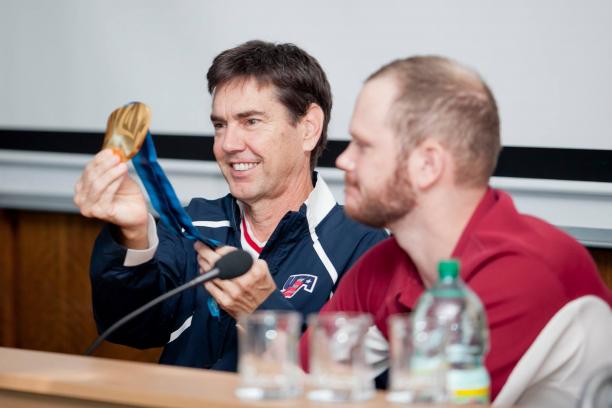US sport envoys promote ice sledge hockey
26.10.2016Paralympic gold medallists travel to Slovakia as part of a US embassy programme which also aims to promote rights for people with impairments.
 US Paralympic gold medallists Lonnie Hannah and Bradley Emmerson travel to Slovakia as part of a US embassy programme which also aims to promote rights for people with impairments.
© • Sport v meste Dolny Kubin
US Paralympic gold medallists Lonnie Hannah and Bradley Emmerson travel to Slovakia as part of a US embassy programme which also aims to promote rights for people with impairments.
© • Sport v meste Dolny Kubin
Slovakia has produced many hockey greats over the years, including Stan Mikita, Peter Bondra and Marian Hossa. But ice sledge hockey, a variant of the sport played on sledges, is not widely known in the country. At least not until US Paralympic gold medallists Lonnie Hannah and Bradley Emmerson showed up to promote the sport they love while also advocating for disability rights as part of a Bureau of Education and Cultural Affairs (ECA) of the United States Department of State initiative.
With assistance from ECA’s SportsUnited programme, Embassy Bratislava hosted Hannah and Emmerson in Slovakia for a visit that took them from the capital of Bratislava, to Banska Bystrica, and to Dolny Kubin – the home of Slovakia’s national sledge hockey team.
Throughout their programme, the envoys spoke with hundreds of young Slovaks in high schools and at ice rinks about how sports changed their lives. “I met someone who introduced me to adaptive sports,” Hannah told an audience in Banska Bystrica, “and I found out I could do anything I wanted to do, I just had to do it a little bit differently.”
In Dolny Kubin, Emmerson and Hannah trained with the Slovak national sledge hockey team and presented them with a cheque for USD 10,800 to purchase ice sledge hockey equipment. The envoys also conducted an exhibition during a Slovak Champions League match in Liptovsky Mikulas attended by 2,500 fans, visited the National Rehabilitation Centre, and met with Slovak Para athletes.
During the visit, the Slovak Hockey Association and the Slovak Paralympic Committee signed a Memorandum of Understanding to formalise their cooperation and expand interest in the sport.
With their engaging style and gold medal attitudes, Hannah and Emmerson opened minds across the country to the challenges people with impairments face, and to the great things that are possible when societies become just a bit more inclusive.





















